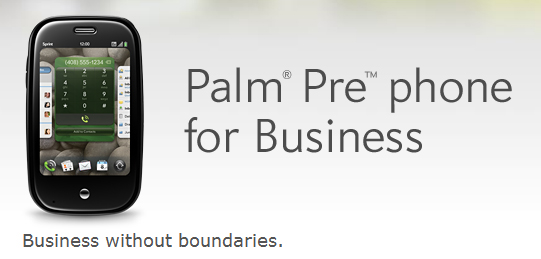Forget the iPhone: Palm targets RIM, business customers with Pre

Few business customers look to Apple's iPhone as the solution for the enterprise. Perhaps it's the device's popularity with teenagers. Perhaps it's the device's pedigree as a media player. Perhaps it's because RIM exerts such power over the business community with its BlackBerry lineup, and the iPhone seems like it has more flash than substance.
Whatever the reason, the new Palm Pre smartphone (available now on Sprint) is seen as the strongest challenger yet to the iPhone crown. But make no mistake: it's not the iPhone Palm executives want to dethrone.
It's the BlackBerry.
In a New York Times report posted this past Friday -- on the eve of the Pre's successful launch -- the real objective behind Palm's launch of its smartphone escaped the lips of company executives.
Jenna Wortham reports:
The executives gathered at The Roosevelt Hotel on Friday morning in Manhattan to show off the Palm Pre kept tossing around one key phrase: “Business customers.”
Business customers are Sprint’s “bread and butter,” explained Dan Hesse, the chief executive tasked with righting the troubled company. Mr. Hesse said Sprint’s business sector accounted for more than half of the company’s revenue.
Mr. Hesse said the Palm Pre embodied the “new Sprint,” a company with improved customer service, a robust cellular network and enough money in the bank to pay off debt that is maturing over the next few years.
“We’re a very different company than we were 12 months ago,” Mr. Hesse said.
That means the real concern for Sprint isn't the one-carrier Apple iPhone, but the multi-carrier RIM BlackBerry lineup.
(Don't believe me? Take a look at Palm's page that's dedicated to business customers, highlighting e-mail, contact management, multitasking, Wi-Fi, GPS, three-way conferencing, call forwarding, Pre's replaceable battery and the company's services, which include backup, updates and security.)
Three key points to takeaway from a possible Palm vs. RIM showdown:
- If Palm wants to field a competitive team, it's going to need several smartphone models to play ball.
- If Palm wants to compete fairly, it's going to need to strike deals with all four major mobile carriers -- not just Sprint.
- Out of the gate, Palm's got to aim for the No. 3 spot in the U.S. mobile market -- behind Apple and RIM but ahead of a storming Team Android (led by HTC, Samsung, Motorola and others) and a sleeping Nokia giant.
The bad news is this:
- Palm's a small company without a lot of cash on hand to outlay for immediate expansion, and Sprint's not exactly in the best of shape, either.
- Palm's got a lot of ground to make up, since Apple's due to release a new iPhone model soon and RIM is already prepping a successor to its ill-welcomed but warmly-received Storm touchscreen smartphone. (Meanwhile, Bold and Curve sales continue to chug along, helping the bottom line.)
The good news is that the No. 3 spot is Palm's for the taking. Why? Because like Apple and RIM, Palm's got a "closed system" -- that is, it controls both the hardware and software aspects of the phone.
Team Android doesn't have that luxury, meaning the promotional dollars to get the word out about Android are limited. Google's a big company, but it's only going to do promo for its own OS. Don't expect a lot of Google dollars to play up the next Motorola smartphone; it's a similar effect the other way around.
When the responsibility is spread out like that, it's hard to enforce quality control.
Compared to Team Android, Palm's got a much easier job keeping focus on what it wants you to notice. With Palm controlling both its new webOS and the Pre hardware, it can address problems more quickly than Team Android, such as the inadequate QWERTY keyboard on the Pre.
(By comparison, how do you address problems with the T-Mobile G1? You replace it with a new phone model, the myTouch. The phone becomes less important than the OS.)
But I digress. What about business customers?
Palm's got a heckuva challenge there, mostly in terms of loyalty. It must convince corporations that the Pre and webOS can do everything businesses need to do from a technical standpoint; that Palm service and support can match that of the favored BlackBerry; and that Sprint ain't as bad as you think it is (nevermind the hemorrhaging of millions of subscribers over the last several years).
That means there's a lot more work to be done.
That also means you should take Palm's words about not coming to Verizon soon with a grain of salt. Contractually, the company's bound to Sprint; it's got to show face in that regard. But if Palm really, really wants to play ball, it's already striking deals with the other carriers in the back room.
Because Palm simply can't afford to wait until the next BlackBerry hits the market.
Complete coverage on ZDNet:
